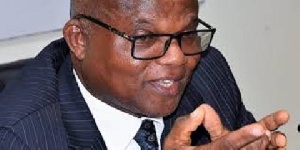 Dr Nana Ato Arthur, the Head of Local Government Service
Dr Nana Ato Arthur, the Head of Local Government Service
Dr Nana Ato Arthur, the Head of Local Government Service, has called for the localisation of the Ghana Beyond Aid (GhaBA) agenda for individuals, households and communities to appreciate it.
Speaking at the ongoing 71st Annual New Year School and Conference, Dr Nana Ato Arthur said just like how the United Nations Sustainable Development Goals (SDGs) had been localised to make it real to individuals, households and communities, the GhaBA could also be localised.
He explained that the GhaBA seeks to harness and deploy the local resources of the country in an effective and efficient manner to create economic opportunities for all.
"It calls for citizens to embrace discipline and change in mindset, values, attitude and behaviours that enable the country to do things differently and in a better way," he said.
"It is also aimed at avoiding the pitfalls of doing business as usual in our governance process, thereby creating the favourable conditions that enhanced our collective effort to achieve economic development objectives."
Nana Ato Arthur, who spoke on the topic "GhaBA: Rejuvenating the Local Economy through Accountable Governance", said the local populace would be the biggest beneficiaries of the fruits of the GhBA Agenda.
He said to enhance the chances of success in implementing sustainable economic development programmes, the Local Government Service had embarked on a number of reforms and interventions aimed at charting a new path that call for a new paradigm and radical shift in mobilising and managing local resources effectively and efficiently to promote national development.
With regard to key prospects for promoting the GhaBA at the decentralised level, Dr Nana Ato Arthur mentioned leveraging local resources as key to sustainable development and working with all actors to promote inclusiveness and local accountability.
He suggested that national budgeting framework must be re-examined to promote effective and efficient local resource mobilisation.
On challenges, he mentioned weak institutional capacity of actors to embrace changes and reforms; and negative mindset of "cannot do it themselves" and overdependence.
Others are unwillingness of the citizens to pay taxes and local rates particularly property rates; and the inability of metropolitan, municipal and district assemblies (MMDAs) to mobilise more local resources to implement their agenda.
"Building a WISER Ghana (Wealthy, Inclusive, Sustainable, Empowered Resilient Ghana) requires all Ghanaians to be committed to decentralisation as a development tool for the country," Dr Nana Ato Arthur stated.
"We, from the Local Government Service, are local and that we recognised that GhaBA simply translate to Adenta Beyond Aid, Komenda-Edina-Eguafo-Abbrem Municipal Assembly, Cape Coast Metropolis.... It is the agglomeration of the 260 MMDAs that constitute Ghana". "I am very optimistic that GhaBA Agenda is attainable," he said.
Mr Daniel Yao Domelevo, the Auditor-General in his contribution advocated for the restructuring of public service in order to accelerate Ghana's socio-economic development. He noted that the issue of corruption was the greatest challenge towards attaining the GhaBA Agenda.
Madam Rita Naa Odoley Sowah, Executive Director, Flowers of Hope International, Accra, in her submission said effective and efficient revenue mobilisation by the MMDAs was critical for the successful attainment of the GhaBA Agenda.
The 71st Annual New Year School and Conference is on the theme: “Attaining Ghana Beyond Aid (GhaBA): Prospects and Challenges.”
It is being organised by the School of Continuing and Distance Education, University of Ghana. The Annual New Year School and Conference was introduced in 1948 and it brings together people from all walks of life to deliberate on topical issues of national and international interest.
Dr Esther Ofei-Aboagye, Chairperson, STAR Ghana Foundation, who chaired the panel discussion, urged civil society to take interest in the GhaBA Agenda.